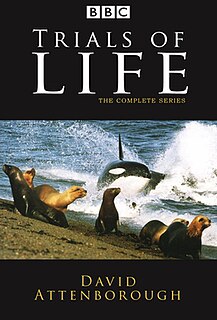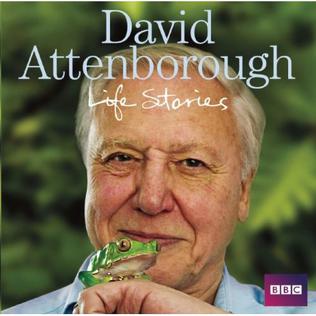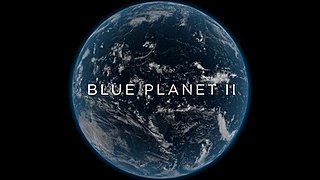
Sir David Frederick Attenborough is an English broadcaster, biologist, natural historian and author. He is best known for writing and presenting, in conjunction with the BBC Natural History Unit, the nine natural history documentary series forming the Life collection, a comprehensive survey of animal and plant life on Earth.

Life on Earth: A Natural History by David Attenborough is a British television natural history series made by the BBC in association with Warner Bros. Television and Reiner Moritz Productions. It was transmitted in the UK from 16 January 1979.

The Trials of Life: A Natural History of Behaviour is a BBC nature documentary series written and presented by David Attenborough, first transmitted in the United Kingdom from 3 October 1990.

Life in the Freezer is a BBC nature documentary series written and presented by David Attenborough, first transmitted in the United Kingdom from 18 November 1993.

The Life of Birds is a BBC nature documentary series written and presented by David Attenborough, first transmitted in the United Kingdom from 21 October 1998.

The Life of Mammals is a nature documentary series written and presented by David Attenborough, first transmitted in the United Kingdom from 20 November 2002.
The BBC Studios Natural History Unit (NHU) is a department of BBC Studios that produces television, radio and online content with a natural history or wildlife theme. It is best known for its highly regarded nature documentaries, including The Blue Planet and Planet Earth, and has a long association with David Attenborough's authored documentaries, starting with 1979's Life on Earth.

Natural World is a strand of British wildlife documentary programmes broadcast on BBC Two and BBC Two HD and regarded by the BBC as its flagship natural history series. It is the longest-running documentary in its genre on British television, with nearly 500 episodes broadcast since its inception in 1983. Natural World programmes are typically one-off films that take an in-depth look at particular natural history events, stories or subjects from around the globe.

A nature documentary or wildlife documentary is a genre of documentary film or series about animals, plants, or other non-human living creatures, usually concentrating on video taken in their natural habitat but also often including footage of trained and captive animals. Sometimes they are about wildlife or ecosystems in relationship to human beings. Such programmes are most frequently made for television, particularly for public broadcasting channels, but some are also made for the cinema medium. The proliferation of this genre occurred almost simultaneously alongside the production of similar television series.

Planet Earth is a 2006 British television series produced by the BBC Natural History Unit. Five years in the making, it was the most expensive nature documentary series ever commissioned by the BBC and also the first to be filmed in high definition. The series received multiple awards, including four Emmy Awards, a Peabody Award, and an award from the Royal Television Society.

Neil Nightingale is a freelance wildlife filmmaker, executive producer and creative consultant with over 35 years experience at the BBC. From 2009 to 2018 he was the creative director of BBC Earth, BBC Worldwide's global brand for all BBC nature and science content.

Life is a British nature documentary series created and produced by the BBC in association with The Open University. It was first broadcast as part of the BBC's Darwin Season on BBC One and BBC HD from October to December 2009. The series takes a global view of the specialised strategies and extreme behaviour that living things have developed in order to survive; what Charles Darwin termed "the struggle for existence". Four years in the making, the series was shot entirely in high definition.

The Private Life of Plants is a BBC nature documentary series written and presented by David Attenborough, first shown in the United Kingdom from 11 January 1995.

David Attenborough's Life Stories is a series of monologues written and spoken by British broadcaster David Attenborough on the subject of natural history. They were broadcast on BBC Radio 4 in 2009 as part of the station's "Point of View" strand, in the weekly timeslot formerly occupied by Alistair Cooke's Letter from America. In each of the 20 programmes, Attenborough discusses a particular subject of personal resonance, drawing on his experience of six decades filming the natural world. The series was produced by Julian Hector, head of radio at the BBC Natural History Unit.
Keith Scholey is a British producer of nature documentaries for television and cinema, and a former television executive. He is the joint series producer of the Netflix original documentary series Our Planet, the joint director and executive producer of David Attenborough: A Life on Our Planet, and executive producer of Breaking Boundaries: The Science of Our Planet. He is the executive producer of the 2021 BBC / Discovery series A Perfect Planet, The Mating Game and The Earthshot Prize: Repairing Our Planet. He also co-directed African Cats, Bears, and Dolphin Reef with Alastair Fothergill for Disneynature, and is also the executive producer of the series North America for the Discovery Channel.

Madagascar is a British nature documentary series, first broadcast on BBC Two and BBC HD in February 2011. Produced by the BBC Natural History Unit and Animal Planet and narrated by David Attenborough, the three-part series focuses on the landscape and wildlife of the island of Madagascar in the Indian Ocean. Attenborough also appears briefly on camera at the beginning and end of the series. Each episode is followed by a ten-minute Madagascar Diaries segment, illustrating the techniques used to film a particular subject.
Attenborough: 60 Years in the Wild is a three-part BBC documentary series chronicling the 60 years career making wildlife programmes of Sir David Attenborough. The first hour-long programme, titled "Life on Camera" was broadcast on Friday 16 November 2012 on BBC Two at 9pm. The second part, "Understanding the Natural World" and third and final part, "Our Fragile Planet" were broadcast on following Fridays, 23 and 30 November 2012.

Life Story is a British natural-history television series with Mike Gunton, Rupert Barrington and Tom Hugh-Jones from the BBC Natural History Unit on the production team. The six-part series reveals the challenges faced by individual animals at different stages of their lives and was first broadcast on BBC One in 2014. The series is introduced and narrated by David Attenborough.

Planet Earth II is a 2016 British nature documentary series produced by the BBC as a sequel to Planet Earth, which was broadcast in 2006. The series is presented and narrated by Sir David Attenborough with the main theme music composed by Hans Zimmer.

Blue Planet II is a 2017 British nature documentary series on marine life produced by the BBC Natural History Unit. Like its predecessor, The Blue Planet (2001), it is narrated and presented by naturalist Sir David Attenborough.
















